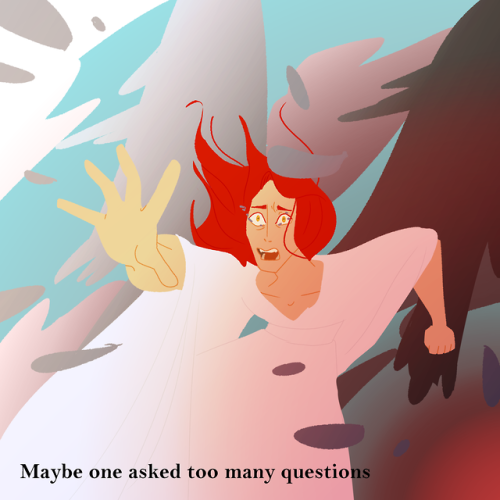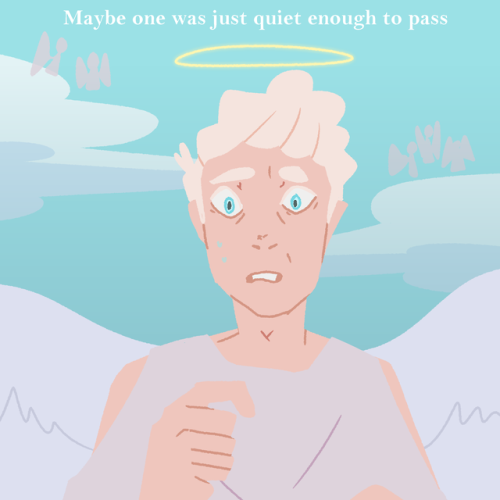Rama And Krishna Trading Places
Rama and Krishna trading places
for @medhasree
“You killed him,” says one of Kaliya’s wives in a voice devoid of all feeling, even as her husband sinks deeper into the waters of the Yamuna. “He was poisoning our waters, and the very air we breathe,” Balarama says, even as his heart yearns after the greatest part of him lying coiled at the edge of the universe. Almost he could slip into the waters himself and, unaffected, slip his arms around his kinswomen to comfort them. Rama, on the banks, cleans his arrows and slips them into a quiver comically big for him, and says, “I killed him, as I kill all monsters who trouble my people.” “We are ourselves everywhere hunted by Garuda,”another wife protests. “If you retaliate by poisoning mortals, you turn from victims to villains yourself. Betake yourselves to Ramanaka Island, and live unharmed.”
“I would love nothing more,” Krishna reassures Surpanakha, “for I cannot remember when last I saw a woman so divinely lovely, bedecked in all the treasures the world can offer and yet needing none to add to her own beauty.” The rakshasi pauses, and the following smile has a distinct gleam of fangs. “You flatter masterfully, mortal, but I can hear a lie. You would love nothing more, yet surely you will find a reason to refuse me.” “I would love nothing more,” Krishna repeats, “but I have a wife already.” “An obstacle easily removed,” Surpanakha suggests, grinning wider than her slender face should allow. Lakshmana springs to his feet, outraged, but then sits again, arrow unnocked, at Krishna’s amused gesture. “But if you kill her I would mourn a hundred summers and scarcely be in a mood for love. You are far too intelligent to think otherwise.” “Since when do mortal men limit themselves to a single wife?” the rakshasi queries. Krishna grins back at her, sunny and careless. “My own father has three queens, and the jealousy of one has brought us to this forest. So I cannot take you for a wife unless you renounce your royal life and live with us as a mendicant, for to do otherwise would cause resentment in my wife. Yet I cannot ask you to sacrifice your life and all its many enjoyments to live with us as my wife does, for that would anger you. You see my dilemma?” “I… yes,” says Surpanakha. “I will have your brother then, if I cannot have you.” “You could marry him,” Krishna allows. “But he is sworn to celibacy, so I would not advise it for one so given to pleasure as you are, O sensuous one.”
“Of course we will fight for you, with all the might Dwaraka has,” Rama assures the Pandavas. “I could hardly do less when my kinsmen are offered insult, and one I have long called a sister.” “One might argue,” says Prince Satyajit, “that it was Yudhishtira who offered insult to our sister, by waging her as he might his slaves.” It is the position Panchal has been taking on the matter, Panchali not excepted, and even Yudhishtira has grown inured enough to offer no ,ore than a tired flinch. “If he were playing against an honourable man, such a wager would not have been accepted, any more than you would trust a drunkard with your beloved child,” Rama says. “It makes no matter; we go to war not for petty faults, but because of dharma and adharma.” “Then must we wait,” Draupadi asks, “while the world grows heavy with adharma? What keeps us from war this instant?” “A vow binds you,” Rama reminds her, gentle and inexorable as a god. “But it does not bind us,” Satyajit points out. Rama’s answering laugh lights up the day, shakes birds from the trees.
Krishna is the one who fetches his wife from the Asoka grove, swings her off her feet laughing, kisses the tears from her eyes, and tells her, “I know this will be difficult for you after all our years in seclusion, but we must do it for the army, and to stifle any rumours before they raise their heads.” In front of the army he embraces her again, this time a conquering hero and not a relieved husband, and says in the voice that massed regiments can hear in the din of battle, “Now is my life lit up again, with Janaka’s chaste daughter in my arms. All my war has been but for this, that I may have my wife by my side once more.”
More Posts from Kaanha-ki-barkat and Others
5 HCs AU: When Sita tries to call upon Bhumi Devi to swallow her up, nothing happens.
1. It is–not quite nothing, a rumble from the earth whispering Not yet, my daughter; but it is not the rest that Sita has wanted for so long.
Around her, courtiers and commoners whisper alike of Maithali’s failure with as much surprise as satisfaction: now, at least, they can silence the lingering guilt at their part in their queen’s exile. Certainly she was to blame all along, and their King’s decision above reproach.
Sita does not speak again, but turns to leave, head held high.
2. She goes back to her cottage in Valmiki’s hermitage, the only place–other than an abandoned hut in Panchavati–that feels like home.
Some, Sita knows, might urge her on to giving up her life: but fire had let her pass unscathed, the son of wind spoken in her favor, and earth her mother forsaken her. Why ought she to imagine the waters might be any different?
In the back of her mind, faint but fixed, is the throb of anger; her husband’s wrath might threaten to destroy the world, but Sita’s is a thousand times more destructive. Lanka learned that lesson all too well; Sita closes her eyes and prays for peace.
3. Kush might be the elder, but Luv the bolder, and Luv the one who asks her at last one night.
“Would you have left us?”
A mother’s instinct almost brings No, of course not to her lips; but Janaka’s daughter does not lie, no more than she hides from hard truths.
“Yes,” she says.
“With a father we scarcely know?”
“Your teacher’s stories–”
Luv scowls. “Are just that.” His mouth curls up, just as it did when he was five years old and refusing to eat his dinner. “You would have left us.”
Sita sighs, and holds out her arms to him. “And I never will again.”
4. “You might have been princes,” she reminds Kush, who should have been heir to Ayodhya. “You might have taken your rightful places.”
He only snorts. “And rule the same louts who scorned our mother? Never.”
She does not dare admit that she is proud of him, but her smile betrays her nonetheless.
5. Sita is tending to her garden when she hears footsteps approaching, coaxing weeds to take life elsewhere; she looks up to find her husband peering down at her, clearly awkward and somehow not yet out of place. His clothes are stark; his head is bare, devoid of the crown. She wonders if Bharata was convinced to take it at last, or if Lakshmana obliged instead.
(She knows too, enough of the ways of ruling to know that a king does not simply wake one morning and renounce his throne. He must have been planning this, moving the pieces into the motion, since the day she and the boys had departed Ayodhya forever.)
“Forgive me,” he says, and Sita, who had half-feared she would never be able to do so, feels her rage ebb at last.
Beneath her bare feet, the earth hums her contentment.

second hand pride




Bonus gif:




or alternatively, ”Aziraphale, look! look at what what i did! i did the thing that you want me to do, Aziraphale! be proud of me! please come back now!”)
I’ve seen a lot of wonderful analyses on how Aziraphale played up the part of Crowley, but I haven’t seen much on Crowley’s portrayal of Aziraphale. This is the angel he’s been in love with for millennia, the angel he’s watched and guarded and adored since before written history began, and finally in the very last episode we get to see what Aziraphale looks like through his eyes.
Standing before the one thing in the universe that could actually destroy him, Crowley’s Aziraphale is resolute, unflinching, gracious to the very end. He talks about the greater good and how angels are meant to be the champions of that greater good even when it goes against how the Great Plan was written. He stands up and speaks his truth even in the face of total opposition. And when the Archangel Gabriel, the person Aziraphale has always tried to emulate, tried to impress, tells him in no uncertain terms that this is what heaven does to the people who fight for the right thing, Aziraphale straightens his shoulders and lifts his chin and says, “It’s been lovely knowing you all. May we meet on a better occasion.” And then he steps into the flames.
We’ve seen other sides of Aziraphale. We’ve seen him be selfish, gluttonous, desperate, closed minded, we’ve seen him be just enough of a bastard to be worth knowing, but when Crowley is asked to take the part of Aziraphale this is who he chooses. This is who he really believes Aziraphale is deep down: kind, chivalrous, compassionate, brave, the sort of angel that heaven ought to be peopled with. The sort of angel who smiles even though he’s broken. The sort of angel who doesn’t mind dying as long as he did the right thing.
Take a moment to say thank you.
Thank you that I am alive.
Thank you that I am healthy.
Thank you that I am able to pursue my passion.
There may be darkness. At times, I may be tempted to give up.
But I don’t.
And not even the strongest of flames can burn this undying gratitude of mine.
For I will always be thankful.
~Nic A


im about to test the limits of discord nitro

-
 lalenn reblogged this · 3 months ago
lalenn reblogged this · 3 months ago -
 lalenn liked this · 3 months ago
lalenn liked this · 3 months ago -
 kamal-nayan reblogged this · 3 months ago
kamal-nayan reblogged this · 3 months ago -
 fix-me-the-stars reblogged this · 3 months ago
fix-me-the-stars reblogged this · 3 months ago -
 kikarou liked this · 3 months ago
kikarou liked this · 3 months ago -
 rawringlife liked this · 3 months ago
rawringlife liked this · 3 months ago -
 artcinemas liked this · 10 months ago
artcinemas liked this · 10 months ago -
 sleepingpotential liked this · 1 year ago
sleepingpotential liked this · 1 year ago -
 body-in-abyss-heart-in-paradise liked this · 2 years ago
body-in-abyss-heart-in-paradise liked this · 2 years ago -
 itsfookingloosah liked this · 2 years ago
itsfookingloosah liked this · 2 years ago -
 123strangeheart liked this · 3 years ago
123strangeheart liked this · 3 years ago -
 severepicklebasketballcookie liked this · 4 years ago
severepicklebasketballcookie liked this · 4 years ago -
 poetessscribe liked this · 4 years ago
poetessscribe liked this · 4 years ago -
 hoursofreading reblogged this · 4 years ago
hoursofreading reblogged this · 4 years ago -
 crazycollectionruins liked this · 4 years ago
crazycollectionruins liked this · 4 years ago -
 i-identify-as-problem liked this · 4 years ago
i-identify-as-problem liked this · 4 years ago -
 mains-stock liked this · 4 years ago
mains-stock liked this · 4 years ago -
 1nsaankahanhai-bkr liked this · 4 years ago
1nsaankahanhai-bkr liked this · 4 years ago -
 ilmacore reblogged this · 4 years ago
ilmacore reblogged this · 4 years ago -
 shyampyari reblogged this · 4 years ago
shyampyari reblogged this · 4 years ago -
 shyampyari liked this · 4 years ago
shyampyari liked this · 4 years ago -
 sprigofsunshine liked this · 4 years ago
sprigofsunshine liked this · 4 years ago -
 cowherdboi reblogged this · 5 years ago
cowherdboi reblogged this · 5 years ago -
 fluffedstar liked this · 5 years ago
fluffedstar liked this · 5 years ago -
 kaanha-ki-barkat reblogged this · 5 years ago
kaanha-ki-barkat reblogged this · 5 years ago -
 kaanha-ki-barkat liked this · 5 years ago
kaanha-ki-barkat liked this · 5 years ago -
 marauderstar liked this · 5 years ago
marauderstar liked this · 5 years ago -
 ararine liked this · 5 years ago
ararine liked this · 5 years ago -
 deewangi-deewangi liked this · 5 years ago
deewangi-deewangi liked this · 5 years ago -
 limerencemoon liked this · 5 years ago
limerencemoon liked this · 5 years ago -
 theawkwardconfusedturtle96 liked this · 5 years ago
theawkwardconfusedturtle96 liked this · 5 years ago -
 demonkidpliz liked this · 5 years ago
demonkidpliz liked this · 5 years ago -
 cherryfish-main liked this · 5 years ago
cherryfish-main liked this · 5 years ago -
 herawell reblogged this · 5 years ago
herawell reblogged this · 5 years ago -
 herawell liked this · 5 years ago
herawell liked this · 5 years ago -
 chaanv liked this · 5 years ago
chaanv liked this · 5 years ago -
 ambidextrousarcher liked this · 5 years ago
ambidextrousarcher liked this · 5 years ago -
 glyphenthusiast reblogged this · 5 years ago
glyphenthusiast reblogged this · 5 years ago -
 glyphenthusiast liked this · 5 years ago
glyphenthusiast liked this · 5 years ago -
 gorecorset liked this · 5 years ago
gorecorset liked this · 5 years ago -
 ncdoppalapudi liked this · 5 years ago
ncdoppalapudi liked this · 5 years ago -
 desimama123 liked this · 5 years ago
desimama123 liked this · 5 years ago -
 bellairestrella liked this · 5 years ago
bellairestrella liked this · 5 years ago
227 posts








